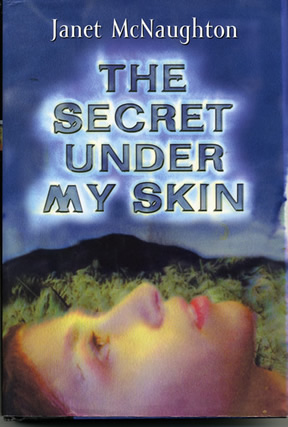Questions to Analyze the Pedagogy in the Book
The Secret Under My Skin
Janet McNaughton, (2005). The Secret Under My Skin. Harper Collins Publishers Inc.,NY. ISBN # 0-06-008989-X

I created these focus questions to assist your exploration and reflection on:
How the content of an experience, as well as the experience itself, creates a learning experience.
The list of questions are to draw attention to places where, I believe learning is happening, or not.
I believe this is significant as it relates to instructional methodology. Particularly the learning cycle or a constructivist philosophy and learning theory, although others can be related.
Also one can relate the situations to learner management issues, facilitating learning, and productive learning.
There are certainly other instances, which I could have included, but chose to limit my focus to Blake and Marrella with respect to what they learned related to science. I encourage you to bring other ideas into your analysis as you desire.
I don't think the questions will spoil the suspense. My hope is it will increase your awareness to the pedagogy. If it doesn't work, let me know.
When I first read it I knew right away it was a powerful story about learning and teaching (pedagogy). I think in a way it is more powerful than the four movies discussed in Productive Learning, I challenge you to convince others of this also or to convince us otherwise. Either way it provides another source to apply and compare productive learning for Marrella and Blake with William, Erica, Hilary, and others as facilitators.
My focus questions:
- How did Labelia/ Blay learn to read to read? Which person deserves most of the credit for her reading ability? Second, Third?
- In what ways is reading important to Labelia/Blay?
- How does Labelia/Blay feel about learning?
- How does Marrella feel about learning?
- William says the tests seem simple, but from them they will tell if Marrella has the talent.
What does the description on page 53 of plant biology say about Blay as a learner? - How is it that she is able to achieve?
- Compare the different feelings that Blay and Marrella have before the first test?
- Marrella insists that a small clump of purple flowers is the plant. Blay is sure it is not. However, she digs it up. How does this fit with different pedagogical views? Could there have been better alternatives she could have chosen? How would different alternatives change the pedagogy?
- The titles of the chapters and Williams unspoken lesson plans start with the chapter - The First Test and follow with the chapter - The Lesson. This implies that his intention all along, if he planned, was to have the test and then the lesson. What pedagogical practices does this fit and not fit?
- Chapter Taming the Shrew Page 104-108. Contrast the learning experience of Marrella and Blake and William.
- Blake thought about leaving the Geology book behind, but did not. What pedagogical practices does this action support and what convinces you of your explanation?
- What pedagogical experiences were necessary for Blake to be able to change from thinking that; Before I would have never imagined my self worthy of such a fine garment, but now I do?
- What pedagogical practices made Blake so confident in the belief that her response for all three tests were correct?
- What is the likelihood the author did not believe the reader would think it possible for Blake to pass all three tests without adding the gimmick of the saying “...the logic that led to the right answers was embedded in holograms in the books Marrella read?” I think the author erred here. I would have found it totally plausible in fact likely that anyone who is scientifically literate could draw the same conclusions of lichen, mole, and the connectedness of all matter through time. Discuss the pedagogical likelihood of that happening as a result of a learning environment. If I desired to teach a class with the hopes of these results, what would need to be included, how would learning need to be facilitated, what activities and interactions would students need to experience to achieve the same success?
- How does Marrella’s approach to knowledge compare with students in schools today?
What pedagogical practices can be used to reach children like her? - Page 162-163 The power of knowledge. What is a “Living system of knowledge?” How can one be created? How does this compare to science literacy?
- Blake’s misconceptions about the connection between passing the test and the bio-indicator were not discovered by William and Erica until they had life altering consequences for for Blake and Marrella. How might this have been avoided? What kind of pedagogy might reduce this from happening? How does this related to productive pedagogy?